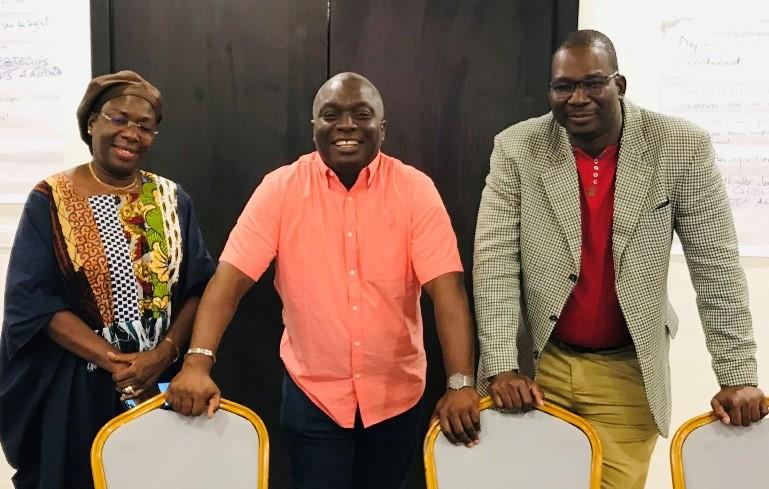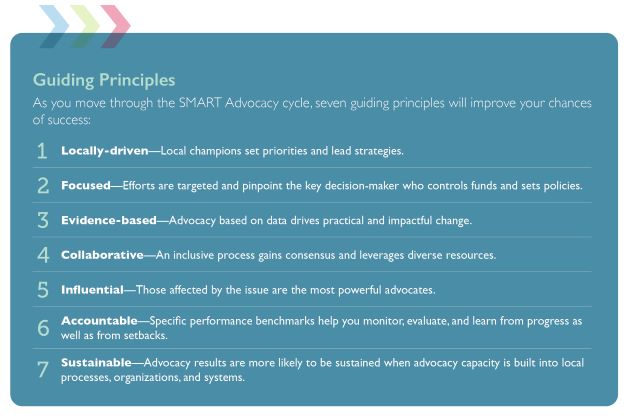
This blog was originally published by Pathfinder International. Egalement disponible en français ici.
Creating a regional pool of facilitators on the SMART Advocacy 2.0 approach in West Africa
By: Habeeb Salami, Brigitte Syan, Celestin Compaore, Marieme Diouf Diallo
For youth activists across West Africa, a “seat at the table” is not enough—young people must be closely involved and engaged in the family planning (FP) and reproductive health (RH) policies and programs that are designed to serve their needs. To build leadership capacity and make a real impact on FP/RH policy and programming, young people must be equipped with—and empowered to use—the tools they need for effective advocacy.
That’s why Pathfinder International, in collaboration with PAI, AFP, and the Ouagadougou Partnership, is implementing a regional project to support and mentor youth organizations to further empower them in their advocacy work to build results from their countries’ costed implementation plans for FP.
One of the project’s components is to strengthen the capacities of young people in advocating for strong policies. Pathfinder, in partnership with Jhpiego and PAI, recently organized a workshop to train facilitators on the newly refreshed “SMART Advocacy” approach in Abidjan, Côte d’Ivoire. The facilitation session was attended by youth from civil society organizations (CSOs) from five countries: Burkina Faso, Côte d’Ivoire, Niger, Togo, and Senegal. The session had the following objectives:
- Strengthen the capacity of local youth CSO members to use the revised SMART advocacy approach.
- Engage members of these youth organizations to use effective facilitation techniques and pedagogical approaches to advance evidence-based policy gains.
Why SMART Advocacy?
SMART Advocacy is a targeted approach to creating incremental changes. SMART advocates identify near-term opportunities for change, and the decision-makers who can act on them. This locally-led approach is increasing political and financial support for family planning, through its “SMART” approach: work that is Specific, Measurable, Attainable, Relevant, and Time-bound.
SMART advocacy’s series of nine steps give users a clear set of guidelines to follow, demystifying the advocacy process, and allowing them to build incremental wins.
Training the Trainers
One critical aspect of ensuring that SMART advocacy works? Training facilitators so the work can have real reach. At a recent training, Pathfinder facilitators shared facilitation techniques and adult learning modules, and walked participants through the three phases and nine steps of the SMART Advocacy approach, through a participatory learning process that included group work and plenary presentation by the participants. Trainers also learned the “guiding principles” of SMART advocacy, the top of which is ensuring the work is locally-driven. By placing this principle up top, we set the stage for local champions, particularly youth, to set the priorities and lead the strategies for advocacy wins.

At the end of this session, each country team mapped out a ‘micro-action plan’ for a training session with youth upon their return. These sessions will be another opportunity for participants to reinforce their facilitation skills acquired in Abidjan and use the SMART Advocacy approach to develop advocacy strategies. This was the first session of its kind in French-speaking West Africa. There are now 14 SMART advocacy facilitators who can further this critical approach in the region.
In the end, why does this matter? Because every day, millions of people are denied the right to decide whether and when to have children. Girls in 117 countries can legally become child brides. 360 million women of reproductive age live in countries where abortion is banned in all cases except to save the life of the mother – and another 90 million live in countries where it is banned entirely. SMART advocacy gives youth, civil society organizations, and community members the power to change these norms, and to advocate for themselves directly, and effectively.
As one recent participant put it: “The future of family planning I want to see is more policies by the government, more family planning friendly facilities. I believe that, to a large extent, a lot of people have done advocacy. People have been advocating. A lot of people have put in the work, people know they need family planning. But the government is still not doing enough. We need more facilities, more policies, more funding, and more accessibility!”
Learn more about SMART advocacy:
- SMART Advocacy 101 (YouTube): https://www.youtube.com/watch?v=RvZ_h-uAxyQ
- Smart Advocacy in Nigeria: https://www.pathfinder.org/smart-advocacy-strengthening-youth-participation-in-advocating-for-improved-adolescent-and-youth-sexual-reproductive-health-in-nigeria/
A day in the life of two youth advocates: https://www.pathfinder.org/a-day-in-the-life-two-youth-advocates-discuss-advocacy-reproductive-health-and-making-a-difference/

